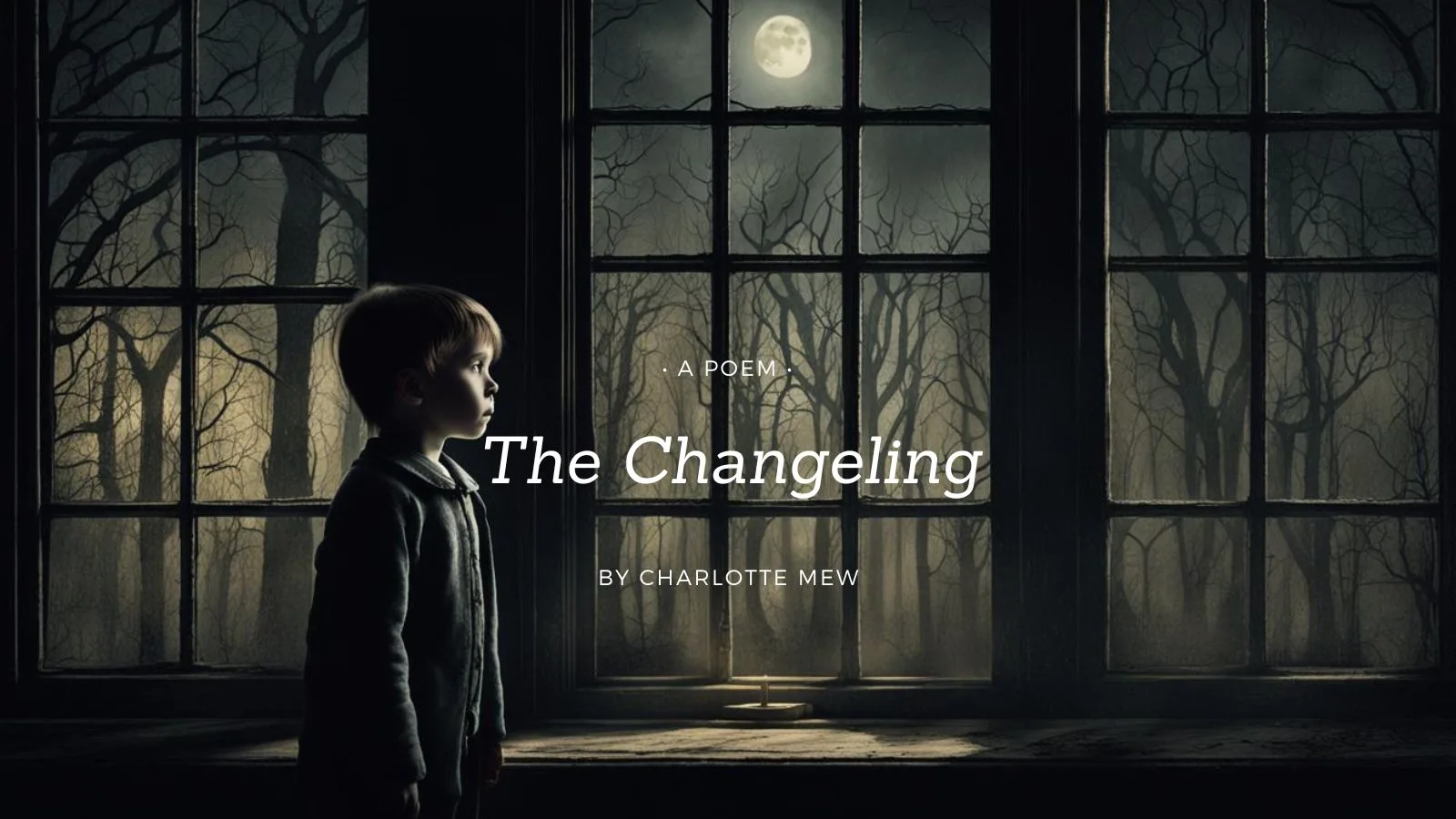The Changeling by Charlotte Mew

The Changeling
by Charlotte Mew
Toll no bell for me, dear Father, dear Mother,
Waste no sighs;
There are my sisters, there is my little brother
Who plays in the place called Paradise,
Your children all, your children for ever;
But I, so wild,
Your disgrace, with the queer brown face, was never,
Never, I know, but half your child!
In the garden at play, all day, last summer,
Far and away I heard
The sweet “tweet-tweet” of a strange new-comer,
The dearest, clearest call of a bird.
It lived down there in the deep green hollow,
My own old home, and the fairies say
The word of a bird is a thing to follow,
So I was away a night and a day.
One evening, too, by the nursery fire,
We snuggled close and sat round so still,
When suddenly as the wind blew higher,
Something scratched on the window-sill.
A pinched brown face peered in—I shivered;
No one listened or seemed to see;
The arms of it waved and the wings of it quivered,
Whoo—I knew it had come for me;
Some are as bad as bad can be!
All night long they danced in the rain,
Round and round in a dripping chain,
Threw their caps at the window-pane,
Tried to make me scream and shout
And fling the bedclothes all about:
I meant to stay in bed that night,
And if only you had left a light
They would never have got me out.
Sometimes I wouldn’t speak, you see,
Or answer when you spoke to me,
Because in the long, still dusks of Spring
You can hear the whole world whispering;
The shy green grasses making love,
The feathers grow on the dear, grey dove,
The tiny heart of the redstart beat,
The patter of the squirrel’s feet,
The pebbles pushing in the silver streams,
The rushes talking in their dreams,
The swish-swish of the bat’s black wings,
The wild-wood bluebell’s sweet ting-tings,
Humming and hammering at your ear,
Everything there is to hear
In the heart of hidden things,
But not in the midst of the nursery riot,
That’s why I wanted to be quiet
Couldn’t do my sums, or sing,
Or settle down to anything.
And when, for that, I was sent upstairs
I did kneel down to say my prayers;
But the King who sits on your high church steeple
Has nothing to do with us fairy people!
’Times I pleased you, dear Father, dear Mother,
Learned all my lessons and liked to play,
And dearly I loved the little pale brother
Whom some other bird must have called away.
Why did They bring me here to make me
Not quite bad and not quite good,
Why, unless They’re wicked, do They want, in spite, to take me
Back to their wet, wild wood?
Now, every night I shall see the windows shining,
The gold lamp’s glow, and the fire’s red gleam,
While the best of us are twining twigs and the rest of us are whining
In the hollow by the stream.
Black and chill are Their nights on the wold;
And They live so long and They feel no pain:
I shall grow up, but never grow old,
I shall always, always be very cold,
I shall never come back again!
Summery
The poem is narrated by a child who believes they are a changeling – a fairy child left in place of a human child. The speaker describes feeling different from their family and drawn to the natural world. They recount experiences that reinforce their belief in their fairy nature, such as hearing strange bird calls and seeing faces at the window.
The narrator explains their sometimes odd behavior, like not speaking or struggling to focus, as a result of being attuned to the whispers and sounds of nature. They express a conflicted relationship with their human family, feeling both love and a sense of not belonging.
The poem concludes with the child’s belief that they will be taken back to the fairy world, leaving behind the warmth and comfort of their human home for a cold, ageless existence in nature.
Throughout, the poem explores themes of identity, belonging, and the divide between the human world and the natural or supernatural realm. The changeling child serves as a metaphor for feelings of alienation and being different from one’s family or society.